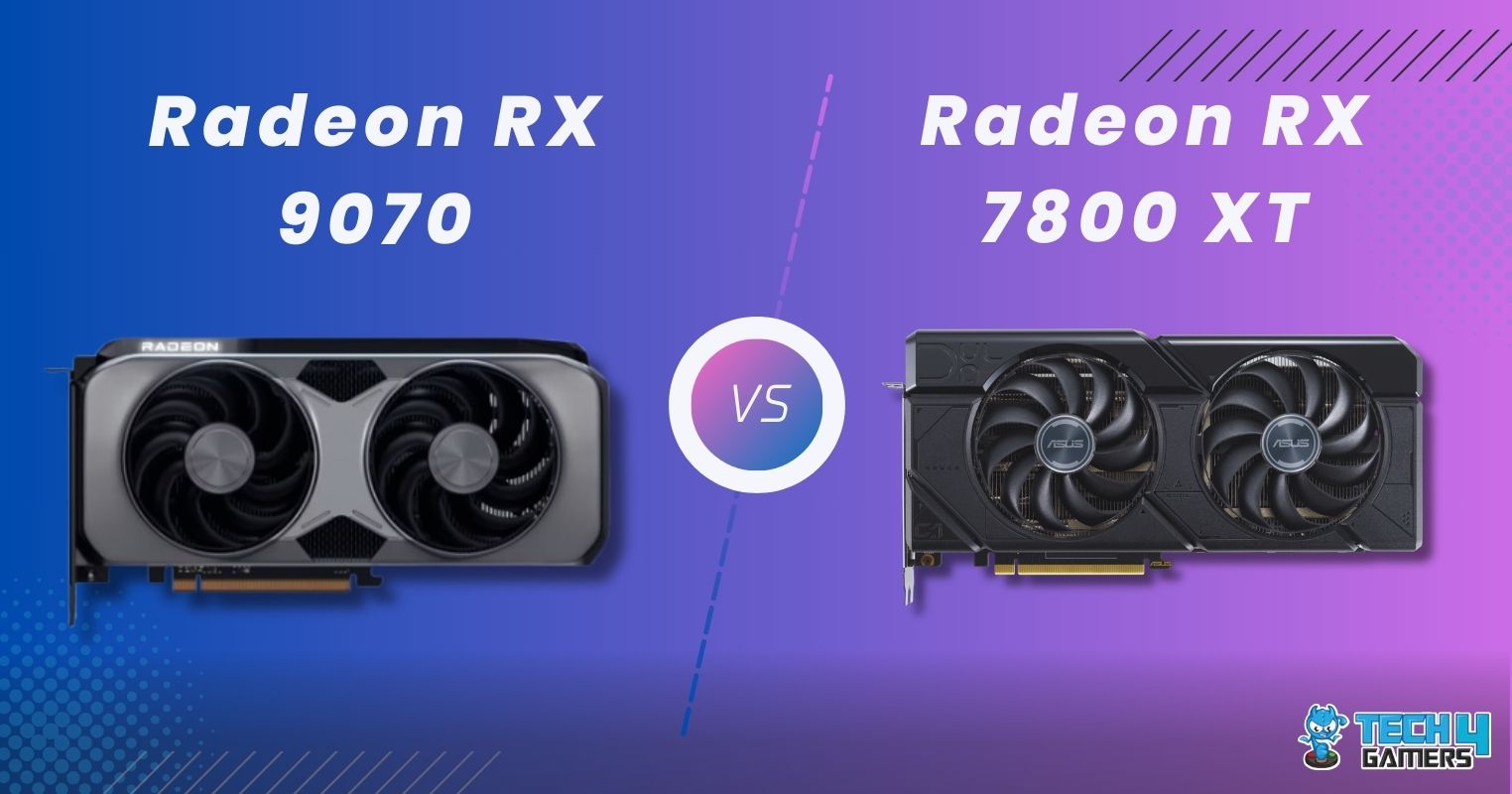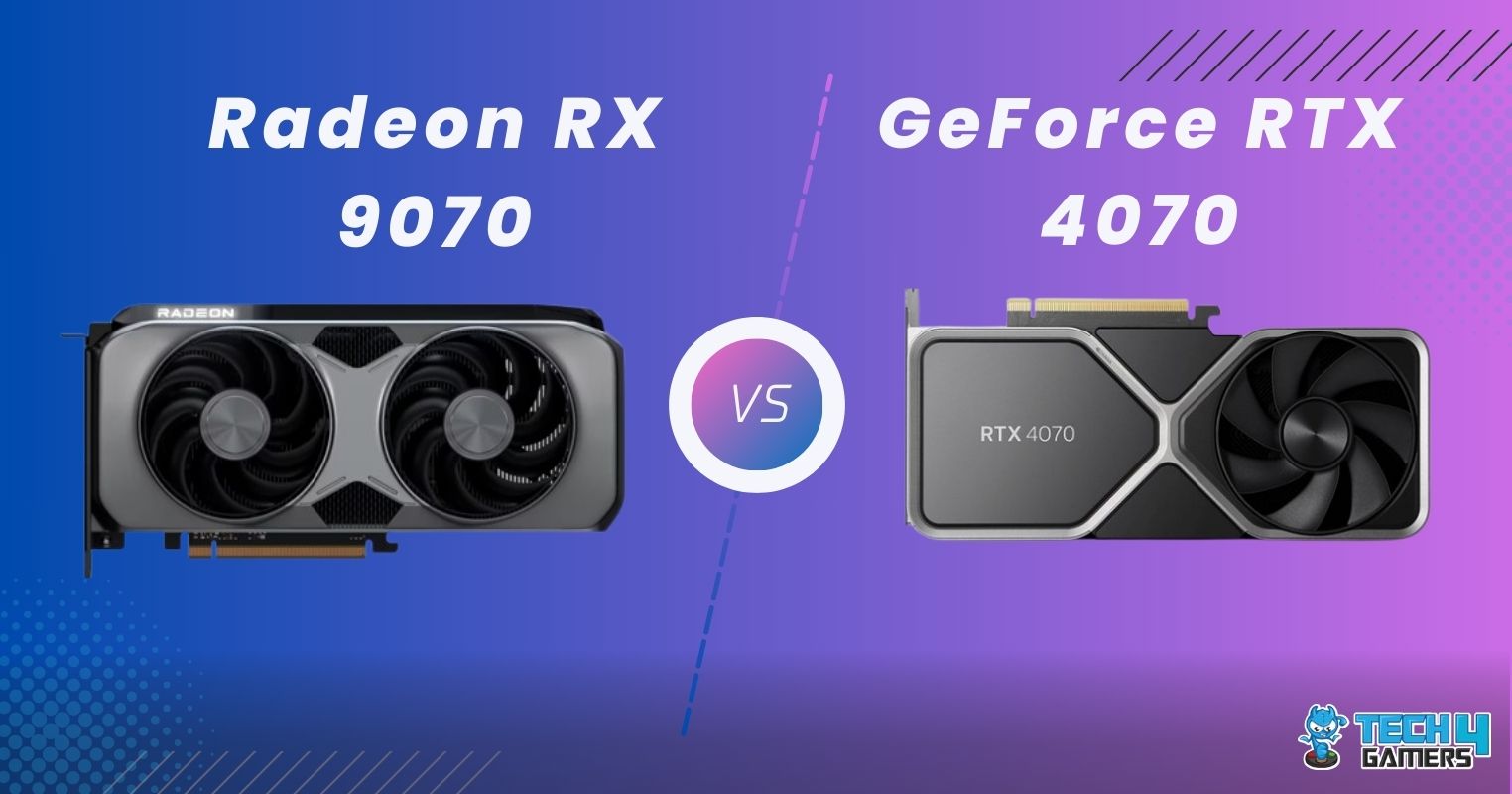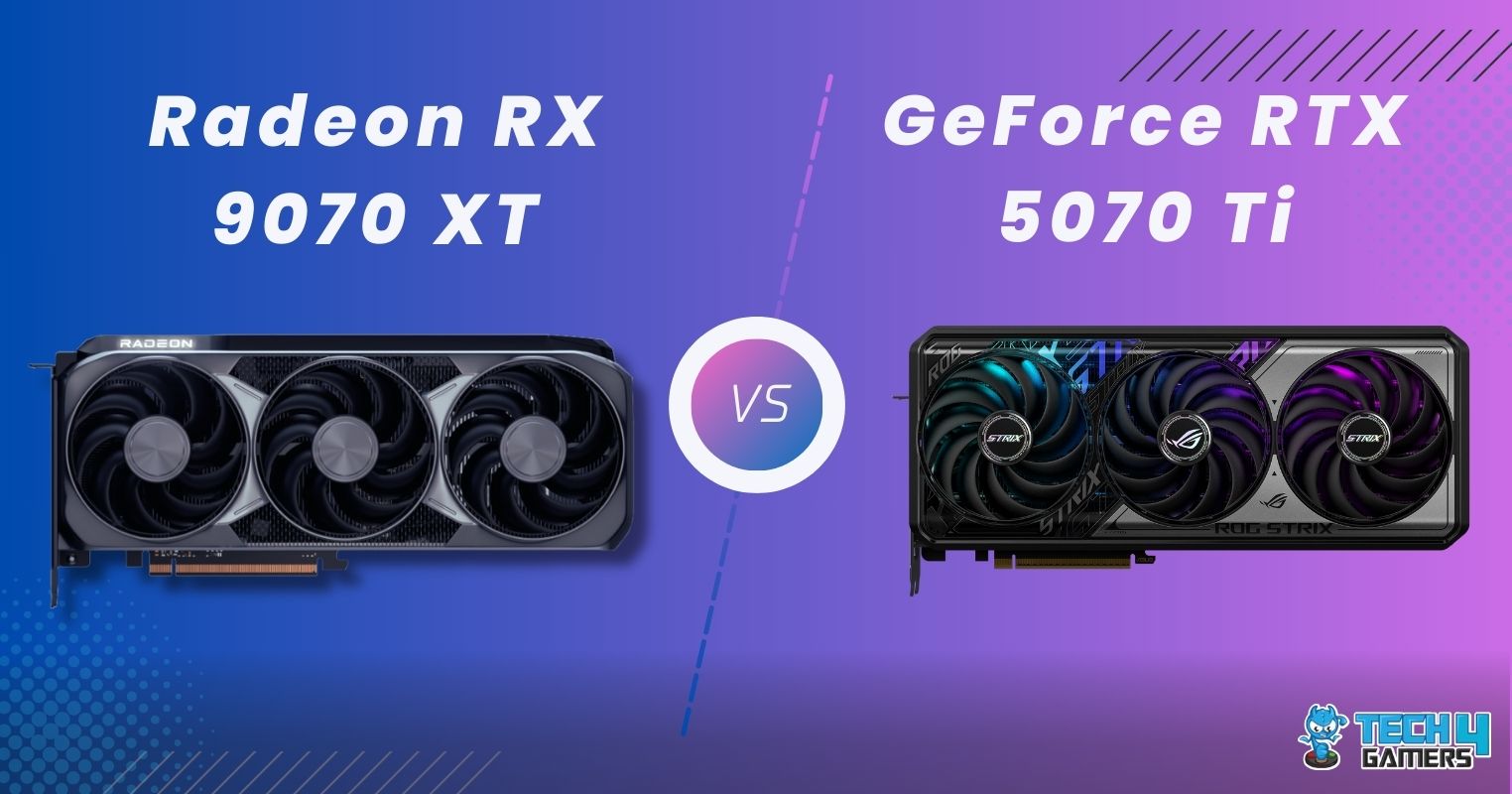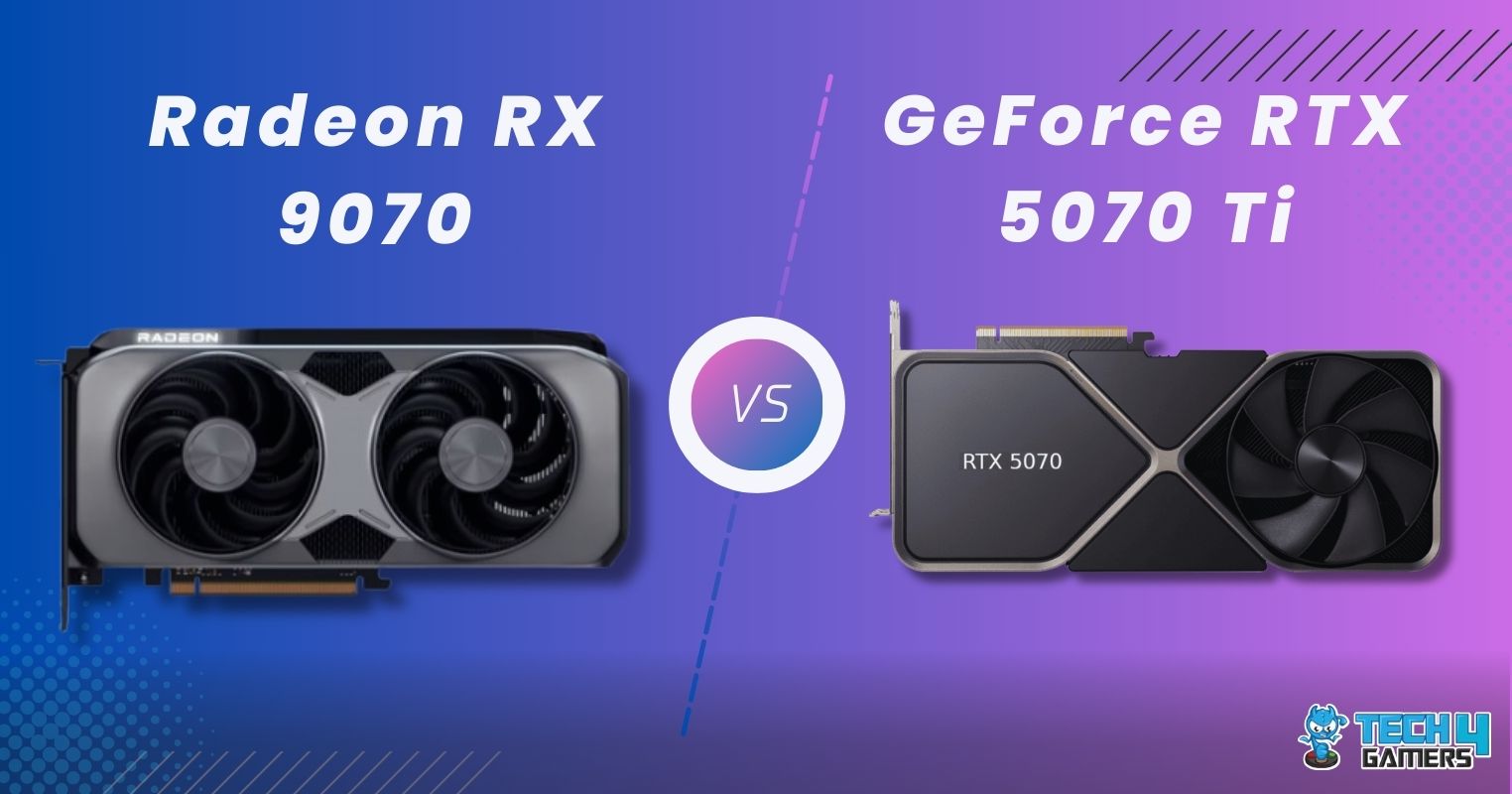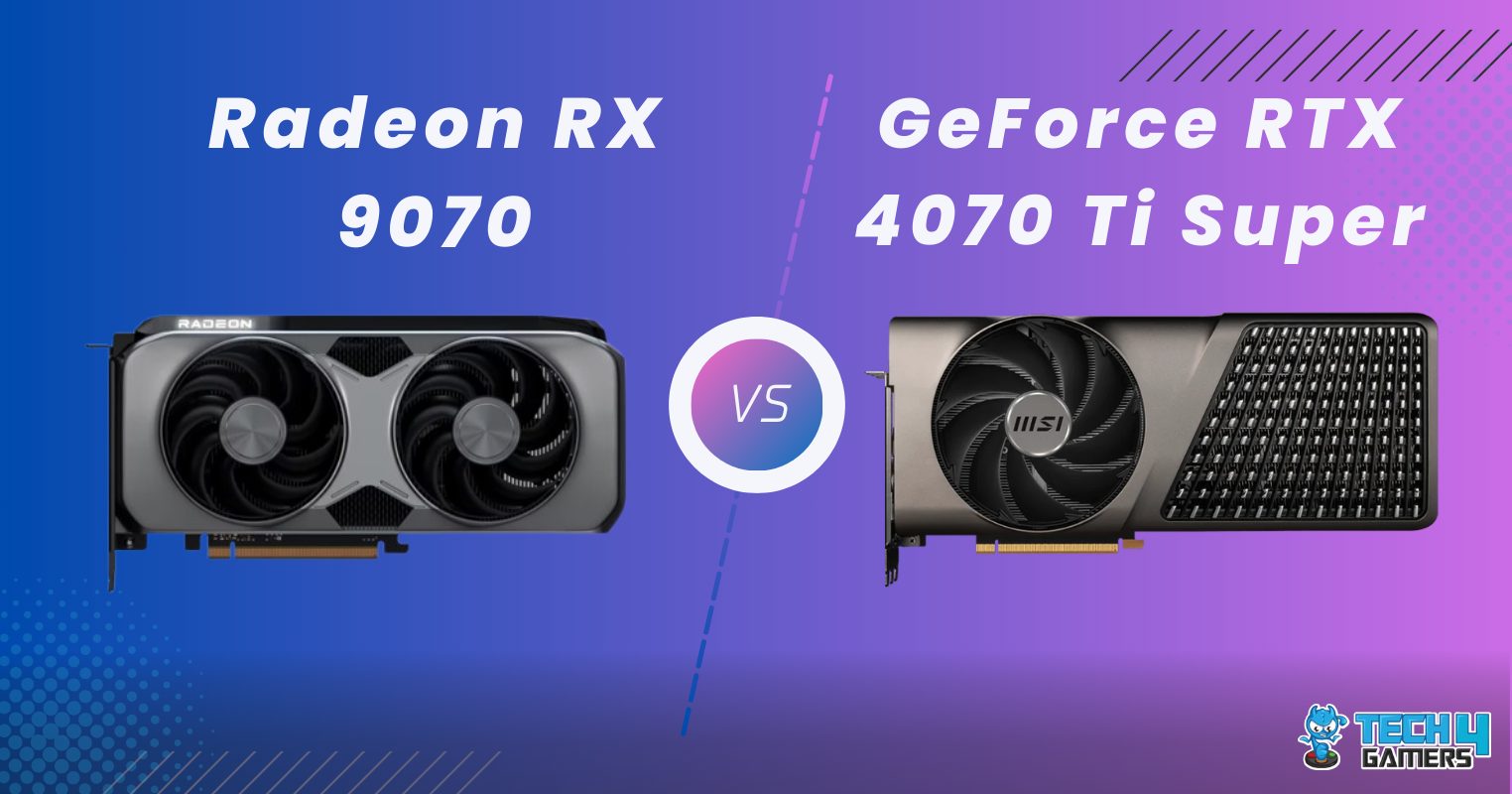Intel released their latest 12th gen Alder Lake processors in November 2021. Announcing the tri-package of the 12900k vs 12700k vs 12600k, Intel did not fail to deliver this time around. Complete beasts for processors, they are, at times, faster than AMD’s 5000 series processors! Today, we’re comparing the i9-12900k vs i7-12700k vs i5-12600k. All three of these processors were launched together with the Intel i9-12900k being an enthusiast-grade processor.
Intel 12th gen processors have a different architecture as compared to other mainstream processors. Utilizing ARM technology, Alder Lake processors have two sets of cores: Performance (P) Cores and Efficiency (E) Cores. P-Cores are the stronger cores that provide benefits by maximizing single-threaded performance. On the other hand, E-Cores are higher efficiency cores that help out with higher threaded workloads.
12th gen processors are undeniably efficient due to the utilization of P-Cores and E-Cores. All the E-Cores manage background tasks while games automatically utilize the P-Cores. The Windows 11 scheduler allows the cores to divide tasks efficiently. You can read more about the differences in Intel 12th gen processors over here!
Comparison Table
Here is a complete comparison table that shows the difference between Intel i9-12900k vs Core i7-12700k, and Core i5-12600k.






Taking a glance at these specifications, there are a few things that stand out. First off are the number of threads correlating with the number of cores. Every P-Core has 2 threads while every E-Core only has 1 thread. This justifies the odd number of threads in each of the 12900k vs 12700k vs 12600k processors.
Next up, we have the multiple clock speeds. P-Cores and E-Cores have separate clock speeds. The P-Cores being the architecturally heavy cores have a greater clock speed than the E-Cores. The E-Cores and P-Cores affect the overall clock speed of the processors as well.
Differences Between 12900K vs 12700K vs 12600K
Although the 12900k vs 12700k vs 12600k processors are from the same generation, they are still part of different families. There are multiple differences between the 3 of these processors:
Power Consumption
The i9-12900k, i7-12700k and i5-12600k processors have similar Thermal Design Power (TDP) at 125 W. However, this base power requirement is easily changed in Alder Lake. When comparing the 12900k vs 12700k vs 12600k processors, we need to take a closer look at the max watt boost.
The i5-12600k is supposed to be an entry-level processor for Intel 12th gen. As such, its power limits aren’t too high when compared with the i7-12700k. Both, the 12600k vs 12700k have a base wattage of 125 W. However, the i5-12600k has a max wattage boost of 150 W while the i7-12700k has a max wattage boost of 190 W. What does this mean? Simply put, the i7-12700k gets hotter than the i5-12600k but gives more performance too. You’ll need adequate cooling to run a i7-12700k at full power.
This 190W max wattage boost pales in comparison to the 241W showcased by the i9-12900k, however. The 12900k has a greater headroom in terms of wattage which allows it to maintain boost clocks for longer. One thing to keep in mind, though, is that the i9-12900k gets extremely hot.
Verdict
In terms of power consumption, the i9-12900k easily takes the lead. Taking over 240 Watts of power, you will need a sufficient power supply too. For the i5-12600k, on the other hand, you will be fine with a smaller power supply. The i7-12700k simply sits in the middle of the two; utilizing adequate wattage.
Related Article: i9 12900k vs i7 12700k
Thermal Differences
A lot of things matter when talking about controlling temperatures in a computer. Coolers, fans, casing, placement of fans, adequate airflow, just to name a few. What we’re discussing is how much each processor from our 12900k vs 12700k vs 12600k battle is prone to heating up.
Looking at the i9-12900k first, this processor is known to heat up a lot. You should expect minimum temperatures of 40-45C at idle and as much as 90-95C when under load. As such having a 360mm AIO cooler installed should be the bare minimum for the i9-12900k. Here are some of the best 360mm AIO coolers in the market right now!
Moving on to the i7-12700k, this processor has better thermal capabilities. Although, still pretty bad, the i7-12700k idles within the ~33-37C and goes up to the late 70s under load. You will need a decent 240mm AIO to achieve this result, however. You can also under-volt your processor by tweaking the settings in the BIOS to get lower temperatures. It isn’t the easiest thing to do, but is effective, nonetheless.
Then we have the i5-12600k. Having the lowest max boost wattage amongst the three, the i5-12600k is the coolest processor too. If using an AIO cooler, you’ll be seeing decent temperatures within the 20s at idle. These temperatures will shoot up to the late 60s to early 70s under load, however. The lower wattage decreases performance, which is worth noting.
Verdict
Let’s look at thermal differences within the 12900k vs 12700k vs 12600k battle. We can see that there isn’t too much of a difference between the i7-12700k and the i5-12600k. Both go up to 70C under load which cannot be considered outlandish, to say the least. The i9-12900k, however, shoots up to 90C and beyond if not cooled properly. Even with a massive AIO cooler, the processor is seen to go above 80C at least. Even water cooling and multiple fans don’t truly improve the temperatures too much.
The performance you’ll be seeing with the i9-12900k vilifies the absurd temperatures, however. The max boost wattage going up to 241W does warrant temperatures within the 80s and 90s. Seeing how the max temp limit is 100C, you’ll be fine if you cool the processor adequately.
Pricing and Availability
The current situation in the world has radically increased PC part prices and production. Demand — never before heard of — for the tech industry spiked up quickly, dampening supply. We have heard and read these sentences over and over again for the past two years. However, we are now approaching a stable zone and prices are going back to normal at a steady pace.
Looking at the most affordable option, we first have the i5-12600k. Currently available for $279 on Amazon, the processor is ~$10-$20 cheaper than the original MSRP! It is readily available as well making it an amazing upgrade option to Intel 12th gen! This processor might just feed your needs. With bleeding edge technology and raw power, you’re getting a whole lot for the amount you’re paying. You need to keep in mind, however, that for a processor upgrade you’ll need to upgrade your motherboard too.
Next up we have the i7-12700k going at around ~$375 on Newegg. Simply looking at Intel’s website, the recommended pricing goes from ~$410-$420. If it fits your budget, we recommend looking into the better i7-12700k than the i5-12600k for some premium performance. Of course you will need to upgrade your motherboard as well.
Lastly, we have the i9-12900k. Intel’s flagship processor at the time of launch, the i9-12900k costs ~$590-$600. At Newegg, presently, you can find the processor at $605. The processor is showing its popularity for its price. For such a premium product you will definitely need a premium motherboard as well.
Verdict
Looking through the perspective of the i5 12600k vs i7 12700k, there’s about a $100 price difference between both processors. If it fits your budget, we recommend going for the i7-12700k to ensure longevity. Even so, the i5-12600k is an amazing option for gaming and not-so-intensive rendering tasks!
Between the i7 12700k vs i9 12900k, there’s approximately a ~$185 mark-up for the latter. Being the top processor right now, the i9-12900k will ensure that you get all the performance that you paid for! The i7-12700k is still a fairly decent option; however, your use-case scenario shall define which processor you should go for.
If we compare pricing for the i5 12600k vs the i9 12900k, the latter costs almost two times as much! Is it worth looking for the i9-12900k if it doesn’t fit your budget? Not really. You can still get most of your tasks completed with the i5-12600k and ensure longevity. On the other hand, if you’re looking to do some intensive 3D rendering tasks and CAD tasks, then going for the i9-12900k would be your best bet.
Related Article: i7-12700k vs i5-12600k
12900K vs 12700K vs 12600K Gaming Performance
Consumers usually buy high-end processors and graphics cards for gaming purposes. Therefore, we’re going to be testing the 12900k vs 12700k vs 12600k in multiple games and go through the results. These tests have been conducted by Benchmark.
Test Rig
- CPU: Intel i9-12900K vs i7-12700K vs i5-12600K
- GPU: Nvidia RTX 3090 24GB
- Motherboard: Asus ROG Maximus Z690 Hero
- CPU Cooler: Corsair iCUE H150i RGB PRO
- Power Supply: Corsair RM850x White 80PLUS Gold 850W
- Storage: Samsung 970 EVO Plus SSD 1TB
- RAM: 32GB (2x16GB) DDR5 5200 MHz CL40
- Windows: Windows 11
- Resolution: 1080P
All three processors use the same LGA 1700 socket, therefore, the motherboard shall remain the same. The Asus ROG Maximum Z690 Hero has been used to ensure proper voltage output, DDR5 compatibility and peak performance.
The RTX 3090 has been utilized so that there are no bottlenecks from the graphics card. As these tests are supposed to stress the CPU more, we have gone with 1080P resolution.
The Corsair iCUE H150i 360mm AIO Cooler has been used to properly cool the processors so that there is no thermal throttle either. 32GB of DDR5 RAM has also been used along with a 850W Gold rated power supply by Corsair.
Far Cry 6
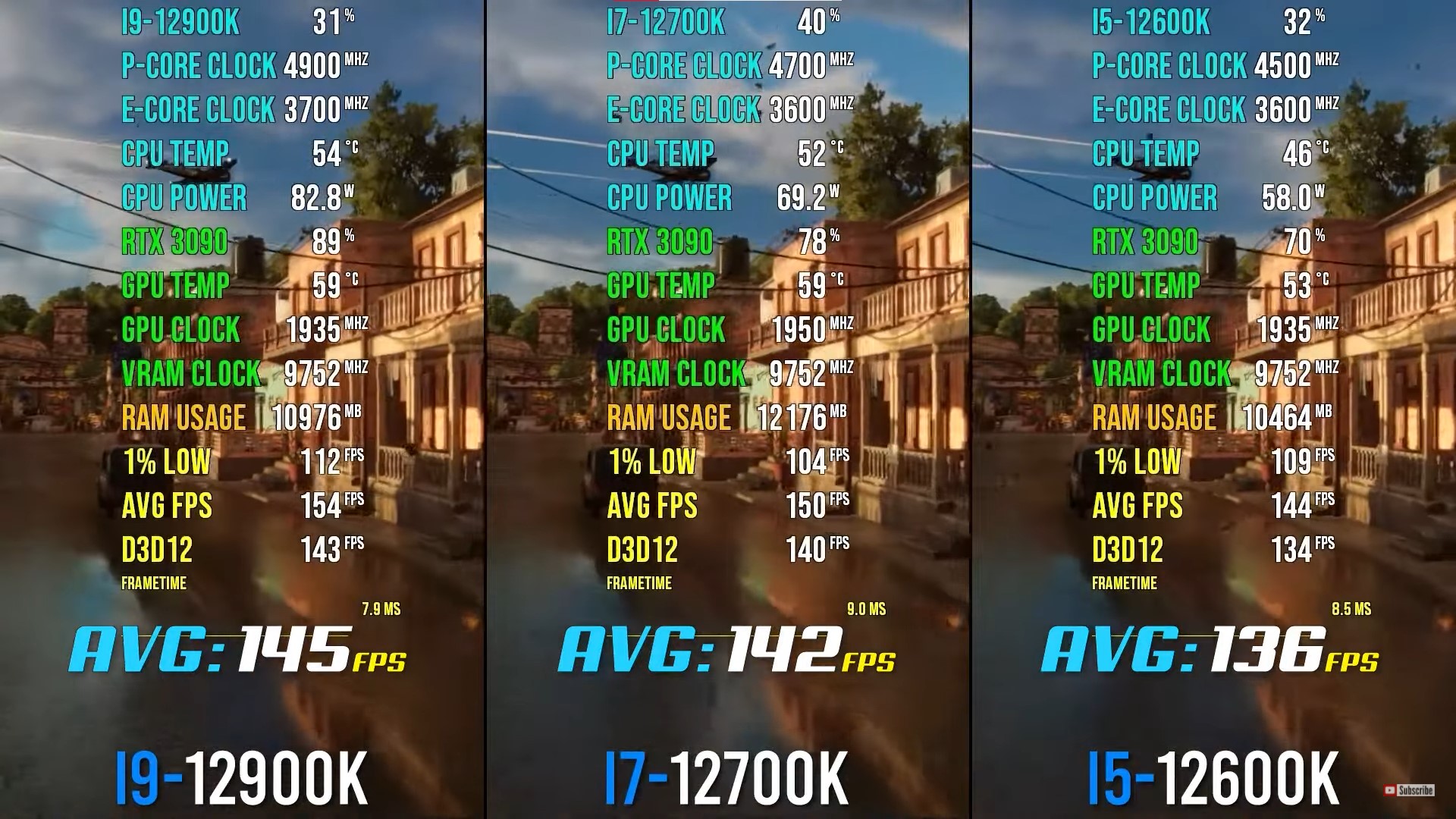
The first game tested is Far Cry 6. The latest edition to the famous Far Cry series, Far Cry 6 is an extremely CPU intensive game. Correspondingly, the game is memory limited too. That means, the more RAM you have, the greater your gaming experience will be.
At first glance, we can see that there isn’t much of a difference between the 12700k vs 12900k. With a diminishing 3 FPS difference, the i7-12700k is doing an amazing job for its price. If we take a closer look, the i7-12700k is being pushed harder with a utilization of 40%. On the other hand, there is only a 31% utilization for the i9-12900k. This is the main reason why there isn’t much of a difference between both the processors.
Furthermore, looking at the 12700k vs 12600k, there is a slightly bigger difference between these two tests. However, it isn’t truly worth the added price for the i7-12700k. If you’re picking between the i7-12700k and the i5-12600k, the i5-12600k might be the better choice in this case.
Lastly, reviewing the 12900k vs 12600k, there is a 9 FPS difference between both processors. Whether these 9 frames are worth the added ~$200 cost is up to you to decide. Overall, the i5-12600k is doing an amazing job by giving the i7-12700k and the i9-12900k a run for their money.
Cyberpunk 2077
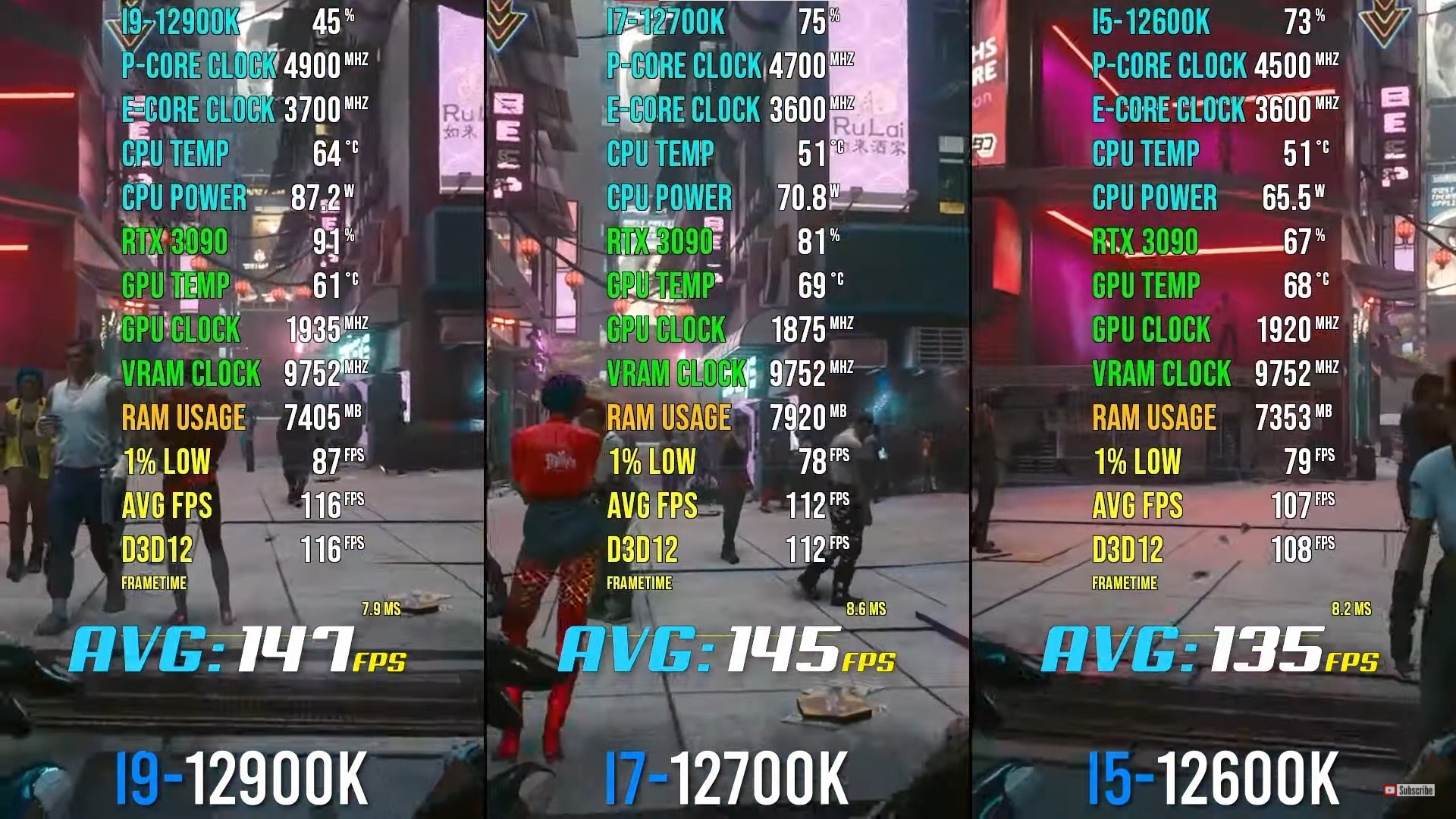
Cyberpunk 2077 is one of the most demanding games in 2022 right now. It is both CPU and GPU intensive along with it being extremely thread hungry too. That means the greater amount of cores and threads you have access to, the better experience you’re going to get.
Even so, at first glance, the 12900k vs 12700k have similar FPS. There’s a meagre 2 FPS difference between both processors. Looking at utilization, the i9-12900k has 45% utilization whilst the i7-12700k has 75% utilization. However, if you take a look at the temperatures, the i9-12900k is at least 13C hotter than the i7-12700k. The i7-12700k is proving its efficiency when pinned against the i9-12900k in this manner.
Going towards the 12700k vs 12600k, there’s a subtle 10 FPS gap between these two processors. Now, if these 10 frames are worth $100 for you then go for the i7-12700k, definitely. However, if you feel that this kind of upgrade would not suit your needs then going with the i5-12600k is a good choice too.
Comparing the 12900k vs 12600k, there’s only a 12 FPS difference. For a processor that costs ~$200 more, one would assume the performance difference would be greater as well. The i9-12900k, in this test, seems to be quite the lackluster. If all you’re going to do is play games then go with the i5-12600k by all means.
Hitman 3
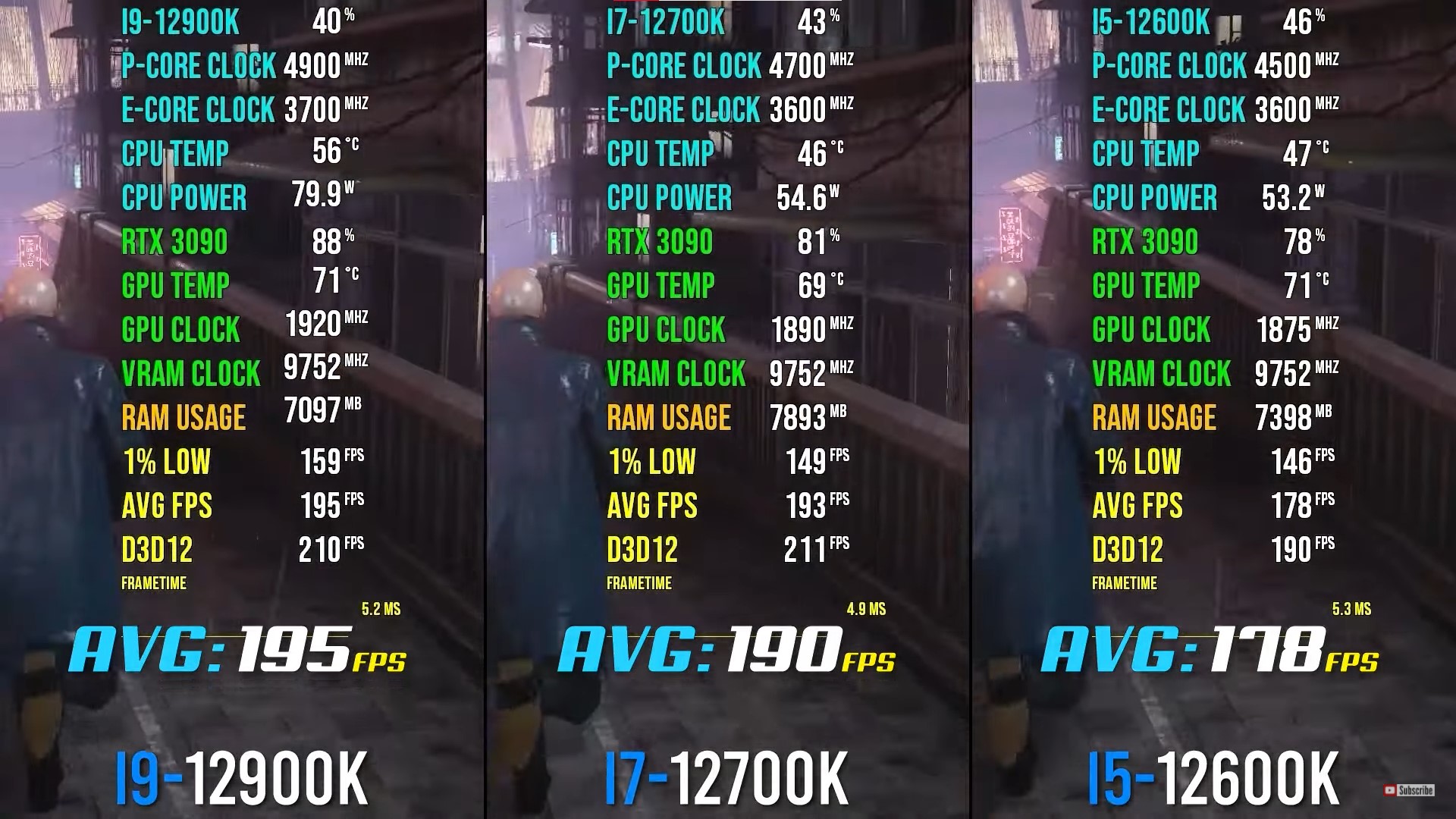
Hitman 3 is a more GPU intensive game than a CPU intensive one. Comparing Hitman 3 with its predecessors, the latest title is less CPU intensive. Despite that, when approaching heavy crowds within the game, the CPU utilization heavily increases. That is one of the main reasons why this game has been chosen for a CPU benchmark test.
Browsing over the 12900k vs 12700k performance, there’s a 5 FPS difference. CPU utilization is pretty similar too. With the former, i9-12900k, going at 40% utilization and the latter, i7-12700k going at 43% utilization. Nonetheless, if you look at the temperatures, the i9-12900k is running 10C hotter than the i7-12700k. This proves you’ll be needing a beefy cooler to pair with your i9-12900k; if you decide to go that route.
Viewing the 12700k vs 12600k, this is where the difference in performance starts to show. With a 12 FPS deterrent, the ever sturdy i5-12600k starts to show its limits in Hitman 3. Does this mean the i5-12600k isn’t a good processor? Not really. You see, the i5-12600k is still an amazing processor to go with if you’re looking to play games without experiencing stutters.
Finally, looking at the 12900k vs 12600k, there’s a significant 17 FPS gap between both processors. However, is this 17 FPS gap worth the $200 mark-up? That depends on your own use case scenario. If you’re going to be doing lots of editing then we recommend you look at the i9-12900k. If not, the i5-12600k is a decent choice to last you for a few years.
Horizon Zero Dawn
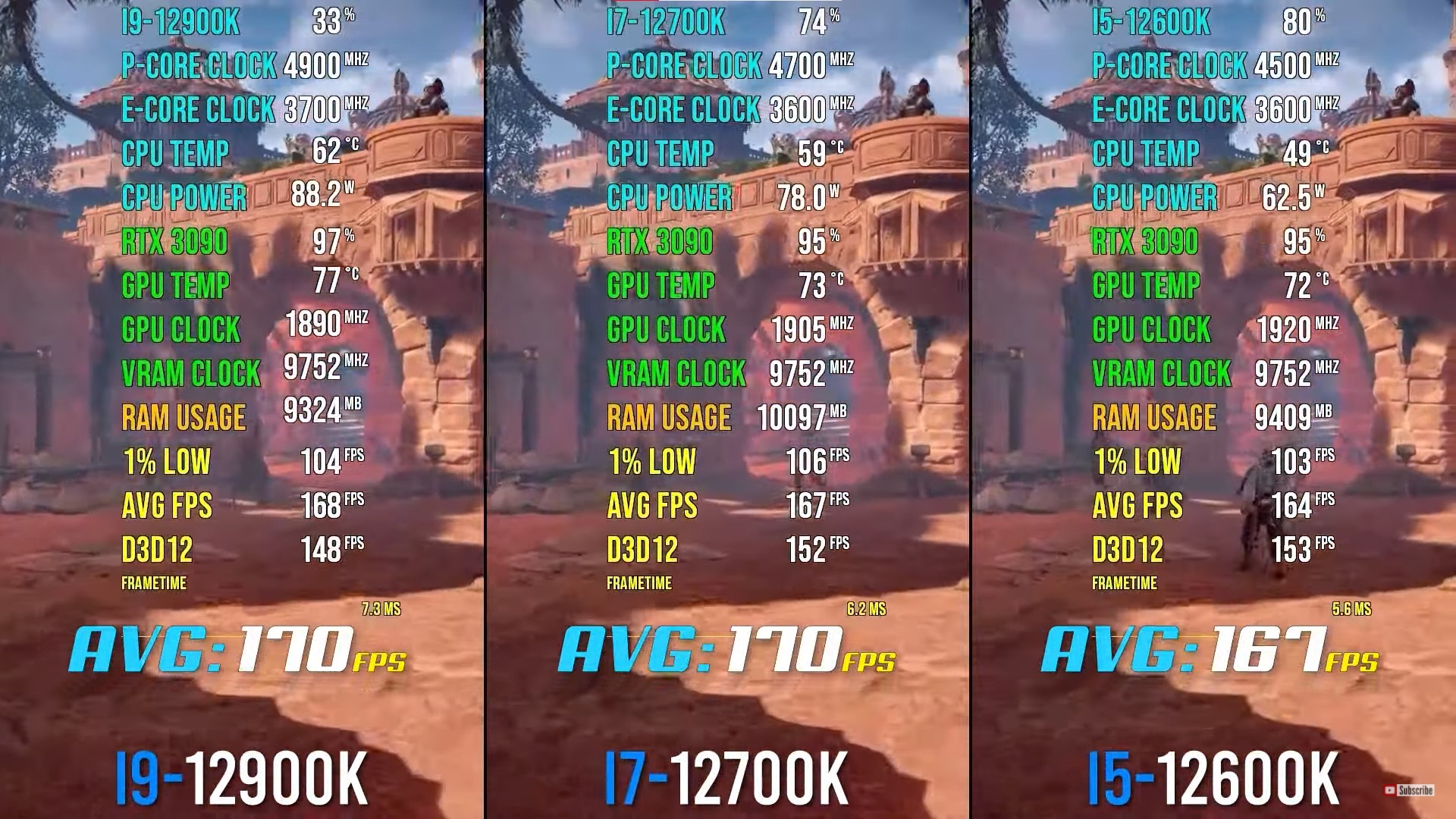
Horizon Zero Dawn is a well optimized game which will run with good FPS using nearly any CPU. The game is a bit GPU intensive, however. With high scale shadows and render objects, Horizon Zero Dawn is an aesthetically pleasing game.
The CPU optimization becomes clearer once we look at the 12900k vs 12700k performance. Both processors are giving an average of 170 FPS on the dot. There’s no difference whatsoever. Temperatures are pretty much level too. 62C for the warmer i9-12900k and 59C for the colder i7-12700k. It’s at the CPU utilization where we start to see a major difference. The i7-12700k has a 74% CPU utilization while the i9-12900k only has a 33% CPU utilization. This explains why the latter has similar temperatures.
There’s a minor 3 FPS difference between the 12700k vs 12600k. With a 6% greater CPU utilization demonstrated by the slower i5-12600k, you’re getting almost identical performance from all three processors. The i5-12600k is running at lower temperatures, however. Only showing 49C at 80% CPU utilization, the i5-12600k showcases LGA 1700’s capabilities.
The exact difference is noticed between the 12900k vs 12600k as well. 3 FPS difference with higher temperatures demonstrated by the i9-12900k. Overall, the i5-12600k is the obvious choice to go with if you’re looking to only play Horizon Zero Dawn. There’s almost no incentive to go with the i9-12900k in such an instance.
Shadow of the Tomb Raider
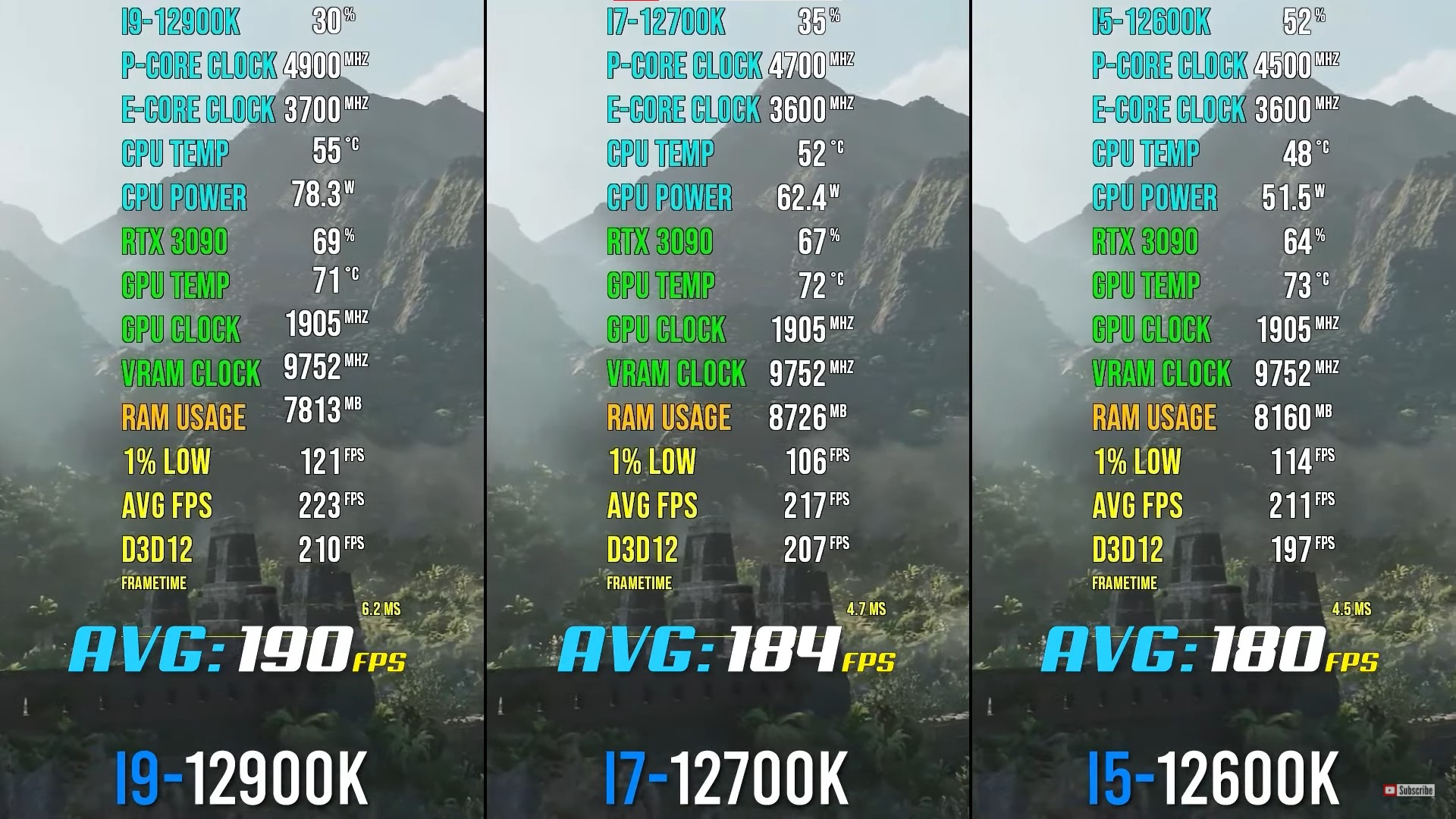
Shadow of the Tomb Raider, successor to the Rise of the Tomb Raider game, is another extremely CPU intensive game. Even though an old game, Shadow of the Tomb Raider is still relevant for benchmarks due to its high dependence on CPU threads.
Starting off with the 12900k vs 12700k, there’s a 6 FPS difference between both processors. Looking at the temperatures, they are pretty much even. 55C for the i9-12900k and 52C for the i7-12700k. The drop in temperatures is most likely due to the lower CPU utilization by the i9-12900k. Going at only 30% CPU utilization, the 12900k has a lot of headroom to keep processing tasks if needed. The i7-12700k isn’t too far behind with 35% CPU utilization, however. Whether the 6 FPS is enough to incite an upgrade path for you or not, both the i9-12900k and the i7-12700k have achieved remarkable results in this game.
Going towards the 12700k vs 12600k, the FPS difference drops down a little. With only a 4 FPS difference, the i5-12600k isn’t too far behind the i7-12700k. You will notice that the i5-12600k is being heavily utilized as opposed to the i7-12700k. Whether this bothers you in making the purchase to get the i5-12600k or not, it definitely shows its capabilities. $100 cheaper and only a 4 FPS difference is a killer deal for gaming purposes.
Then we have the 12900k vs 12600k. There’s not much to look into here. The i9-12900k has a 10 FPS advantage over the budget i5-12600k which isn’t a lot when compared to the price of the processor. The i5-12600k shows why it’s known as the budget king, once again.
Metro Exodus
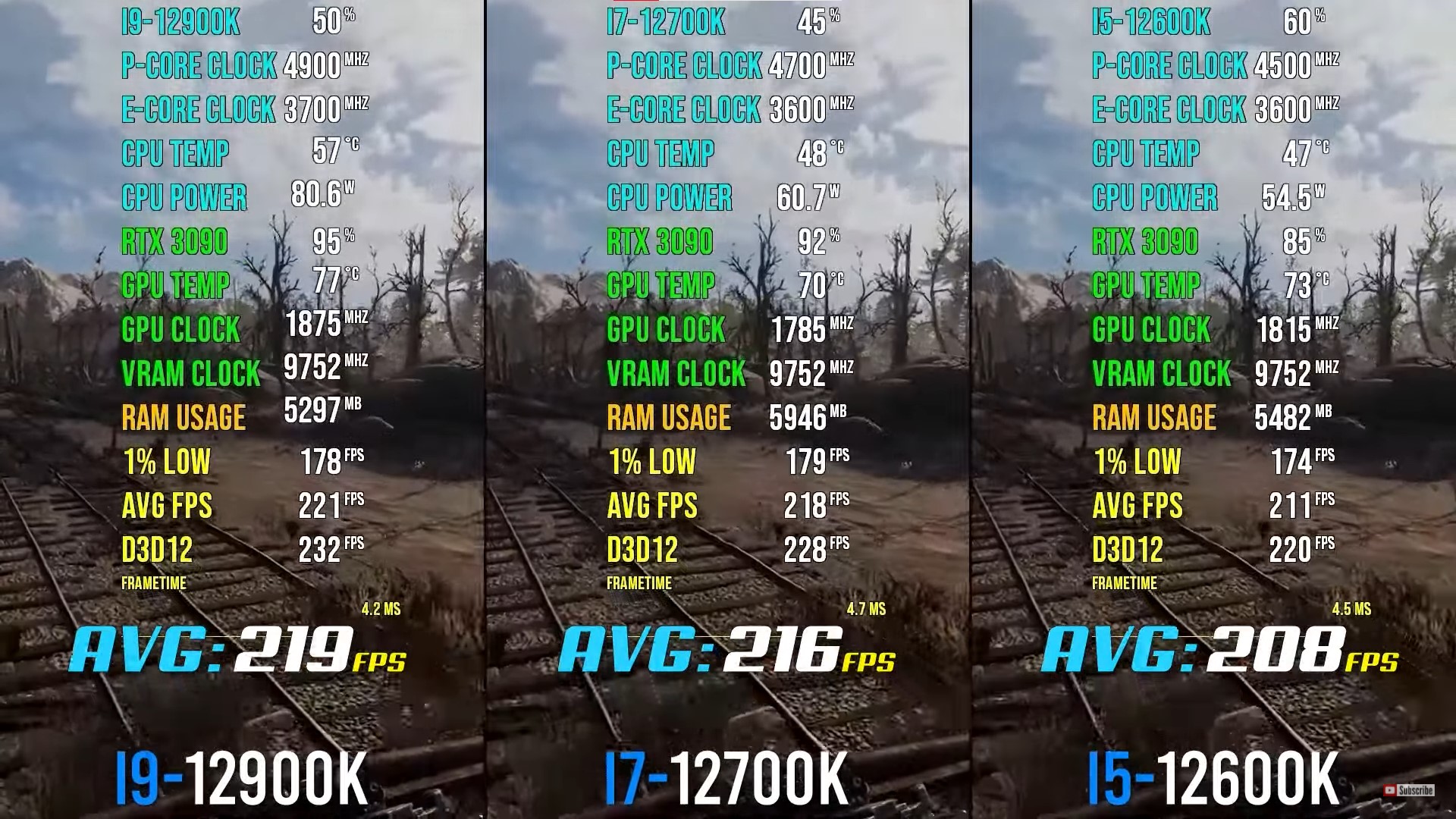
Metro Exodus is a culmination of aesthetics. From shadows to life-like images, the game showcases how much the gaming world has evolved within the last few decades. It is definitely a more GPU intensive game than a CPU intensive game. However, that does not mean that it is not viable for a CPU benchmarking test.
Kicking it off with the 12900k vs 12700k, we see that the GPU utilization has almost hit 100% for both processors. The leading i9-12900k is able to push the 3090 more, thus resulting in the extra 3 FPS. In doing so, the i9-12900k heats up more too. While the i7-12700k goes up to 48C, the i9-12900k is going up to 57C with 5% more utilization.
Checking the 12700k vs 12600k out now, there’s a greater difference in performance between these two processors. Averaging at 208 FPS, the i5-12600k is giving 8 FPS less than the i7-12700k which is leveraging at 216. The temperatures of both the processors are level while the i5-12600k is being utilized more. All-in-all, both the i7-12700k and i5-12600k have shown remarkable performance in Metro Exodus.
In the end we have the 12900k vs 12600k with the i9-12900k taking the obvious lead. Intel’s flagship processor, the indomitable i9-12900k is giving 11 more frames than the budget king, the i5-12600k. Again, whether these 11 frames are worth the added cost is up to you. Both the i9-12900k and i5-12600k are amazing options to handle triple A titled games.
Red Dead Redemption 2
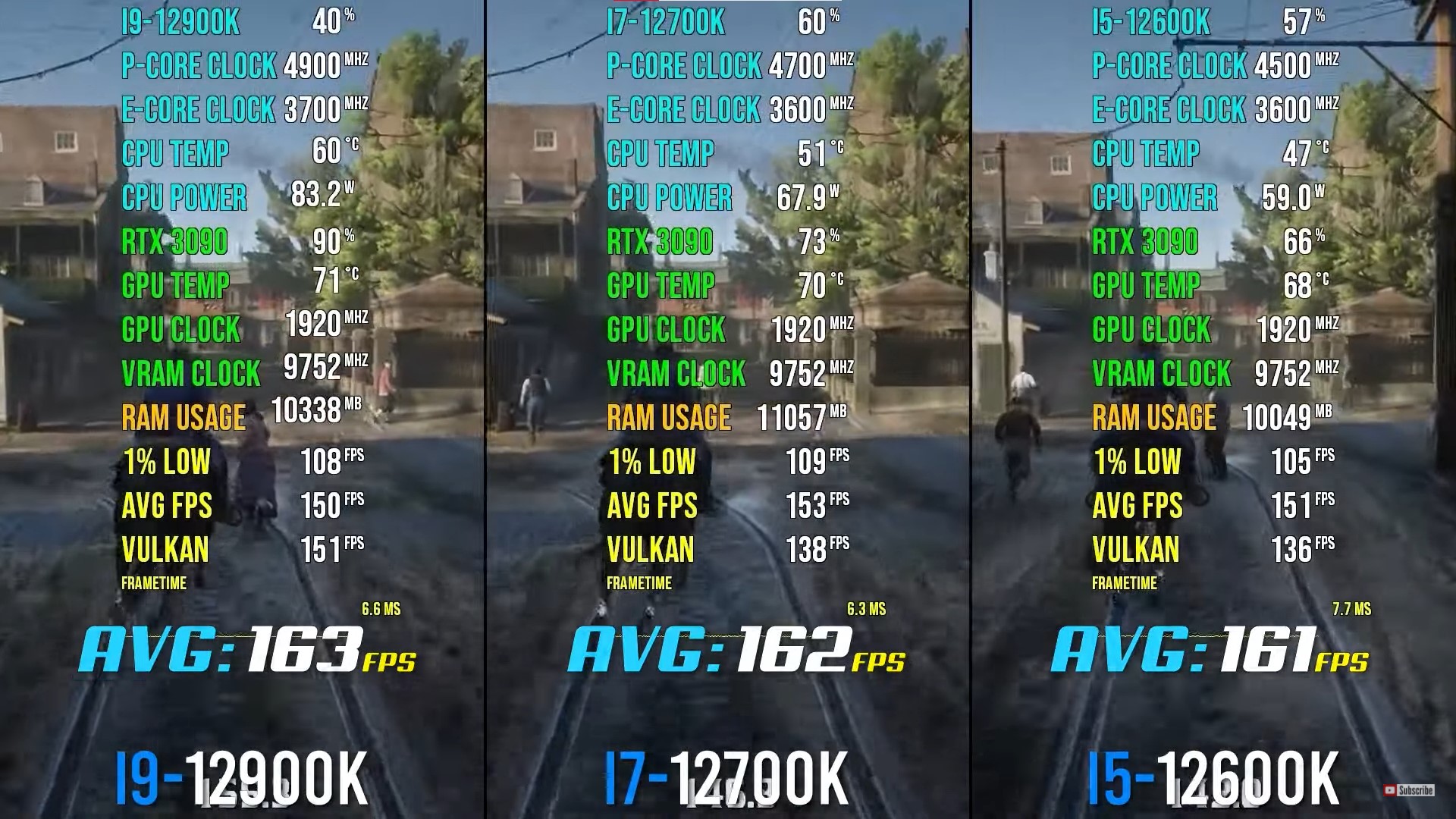
The last game we have for this benchmarking test is Red Dead Redemption 2. Granted that the game isn’t CPU bound, it is still a heavy game to run, nonetheless. Almost always you will be GPU bound while playing Red Dead Redemption 2 unless you’re using a really old processor.
Taking off with the 12900k vs 12700k, the FPS are similar. There aren’t any fluctuations in the FPS as neither processor is bottlenecking the GPU. You will, however, notice that the i7-12700k is being pushed much harder than the i9-12900k. There is a 20% CPU utilization difference between both processors but the i9-12900k is still running hotter by about 9C.
Moving on to the 12700k vs 12600k, there isn’t much of a difference between these two processors either. Running colder than the i7-12700k, there is only a 1 FPS difference. CPU utilization is similar as well, proving that the game isn’t being bottlenecked by either CPUs. This confirms that the i5-12600k is not a couch potato and that it can hold its fair share as well.
At the end we have the 12900k vs 12600k where the results are pretty much the same. A 2 FPS deterrent for the i5-12600k is all we’re seeing. The i5-12600k is, however, 13C cooler than the i9-12900k. If you’re going to have cooling problems then we recommend you get the i5-12600k for its efficiency and cooling capabilities as well.
Which is Best for Gaming?
Overall, throughout the tests all 3 processors, the i5-12600k, i7-12700k and i9-12900k weren’t too far away in terms of performance. The i9-12900k is only ~1.65% faster than the i7-12700k and ~5.5% faster than the i5-12600k. Conversely, the i7-12700k is ~3.8% faster than the i5-12600k.
Simply looking at raw performance, the i9-12900k wins the trophy. However, if we add the element of performance per dollar ratio, the i5-12600k is the most efficient. From temperatures to pricing, the i5-12600k is more than enough to suit all of your gaming needs without you having to spend a fortune on a processor.
The i7-12700k isn’t a bad option either. You get a slight performance uplift for a marginally increase in price. Therefore, if it fits your budget, the i7-12700k is definitely a good processor to go with.
The i9-12900k, on the other hand, is a bit of an overkill for simple gaming needs. It isn’t as efficient as the i7-12700k or the i5-12600k and only gives a small performance boost in games. For rendering and intense CPU tasks the i9-12900k is still one of the best options out there.
12900K vs 12700K vs 12600K in 1440P
By increasing the resolution, games start to become less CPU bound and more GPU bound. FPS drops due to a larger number of pixels being rendered as compared against 1080p. Depending on the CPU and GPU combination you’re going with, the processor can, at times, bottleneck the GPU.
Keeping these things in mind, going with a i7-12700k at 1440p is the best-case scenario. It sits right in the middle of the spectrum and doesn’t cost a fortune either. The i5-12600k is still a valid processor at 1440p, however, you can potentially find yourself bottlenecking the GPU.
Let’s take Cyberpunk 2077, for example. At 1080p, the i9-12900k was ~1.4% faster than the i7-12700k and ~9% faster than the i5-12600k. At 1440p, the i9-12900k is now ~10% faster than the i7-12700k and ~18.5% faster than the i5-12600k.
How did the i9-12900k suddenly gain this FPS boost? It simply did not bottleneck the GPU as much as the i7-12700k and the i5-12600k did. Does the premium price validate this increase in performance? That depends on you to decide. Whether you want the most FPS you can get or whether you’re happy with cutting a few frames out.
12900K vs 12700K vs 12600K in 4K
4K panels, although popular, are part of the premium-grade tech equipment. To run games and do heavy tasks, one requires a sufficient processor too. Naturally, going with the i9-12900k should be your second nature if you’re using a 4K display panel.
Does this mean that the i7-12700k and i5-12600k are obsolete at this resolution? The latter, yes. The former, not really. The i5-12600k won’t serve you as well as it does at 1080p. You will notice a greater number of stutters in your gaming. The better i7-12700k is still a decent option for 4k gaming and content creation related work.
Of course, at 4k we recommend you go with the i9-12900k and not look back again. It will serve you well for at least a few years and will provide you with decent performance as well.
Who is this Article for?
The 12900k vs 12700k vs 12600k article is for consumers who might want to shift towards Intel’s 12th gen processors but cannot decide on which processor to go with. The article takes a closer look towards the latest architecture along with gaming performance at 1080p, 1440p and 4k, pricing and cooling capabilities amongst other things. The article gives an in-depth analysis in terms of percentages and which processor suits different workloads.
Why Should You Trust Tech4Gamers?
Tech4Gamers has been in the tech niche for over 12 years now. With skilled and hard-working individuals, we research and personally test products before writing and publishing articles on them.
Many renowned brands such as Asus, MSI, Gigabyte, DeepCool, among others have acknowledged Tech4Gamers as an authentic space for providing readers with factual and accurate information. Our utmost duty is to be truthful in our remarks and explain to our readers our opinions on certain matters.
Thank you! Please share your positive feedback. 🔋
How could we improve this post? Please Help us. 😔
[Comparisons Expert]
Abdemanaf is a skilled creative writer who has been honing his craft since 2011. While initially working in different fields, he found a passion for technology and has been exploring the tech world since early 2015. Over the years, he has developed an in-depth knowledge of the latest tech trends and product offerings by various companies.
Abdemanaf’s writing reflects his analytical mindset and ability to think critically. He has a knack for breaking down complex technical information into easily digestible pieces, making his articles engaging and accessible to readers from all backgrounds. In February 2022, he joined Tech4Gamers as a blog and product comparison writer, where he has been able to hone his skills further.
As a writer, Abdemanaf is dedicated to staying up-to-date with the latest technological advancements and trends, enabling him to provide readers with the most relevant and accurate information. He is always eager to learn more and is constantly seeking new challenges to improve his skills.
Get In Touch: manaf@tech4gamers.com


